
Edward Teller was a Hungarian-American theoretical physicist who is known colloquially as "the father of the hydrogen bomb" and one of the creators of the Teller–Ulam design. Teller was known for his scientific ability and his difficult interpersonal relations and volatile personality.
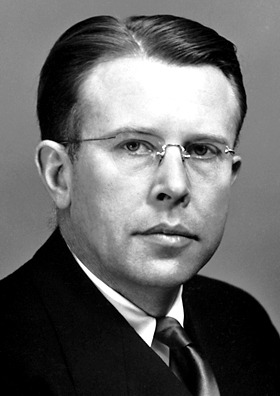
Ernest Orlando Lawrence was an American nuclear physicist and winner of the Nobel Prize in Physics in 1939 for his invention of the cyclotron. He is known for his work on uranium-isotope separation for the Manhattan Project, as well as for founding the Lawrence Berkeley National Laboratory and the Lawrence Livermore National Laboratory.
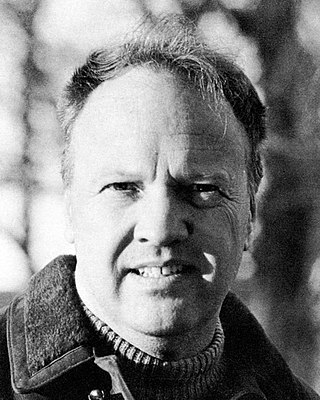
James Lafayette Dickey was an American poet and novelist. He was appointed the eighteenth United States Poet Laureate in 1966. He also received the Order of the South award.
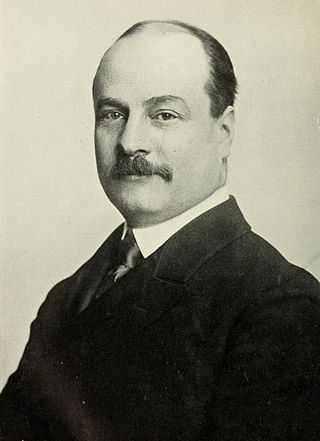
Nicholas Murray Butler was an American philosopher, diplomat, and educator. Butler was president of Columbia University, president of the Carnegie Endowment for International Peace, a recipient of the Nobel Peace Prize, and the late James S. Sherman's replacement as William Howard Taft’s running mate in the 1912 United States presidential election. He was so well-known and respected that The New York Times printed his Christmas greeting to the nation for many years during the 1920s and 1930s.

Richard Lee Rhodes is an American historian, journalist, and author of both fiction and non-fiction, including the Pulitzer Prize-winning The Making of the Atomic Bomb (1986), and most recently, Energy: A Human History (2018).
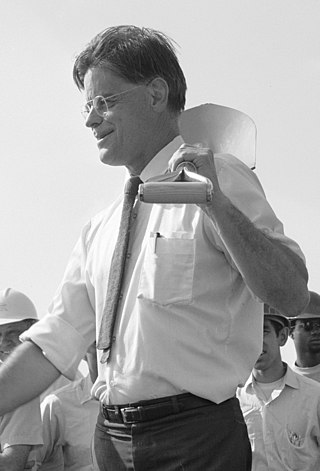
Robert Rathbun Wilson was an American physicist known for his work on the Manhattan Project during World War II, as a sculptor, and as an architect of the Fermi National Accelerator Laboratory (Fermilab), where he was the first director from 1967 to 1978.

Ivy Mike was the codename given to the first full-scale test of a thermonuclear device, in which part of the explosive yield comes from nuclear fusion. Ivy Mike was detonated on November 1, 1952, by the United States on the island of Elugelab in Enewetak Atoll, in the now independent island nation of the Marshall Islands, as part of Operation Ivy. It was the first full test of the Teller–Ulam design, a staged fusion device.

Jean Frances Tatlock was an American psychiatrist. She was a member of the Communist Party USA before it was banned and criminalized in the 1950s and was a reporter and writer for the party's publication Western Worker. She is also known for her romantic relationship with J. Robert Oppenheimer, the director of the Manhattan Project's Los Alamos Laboratory during World War II.
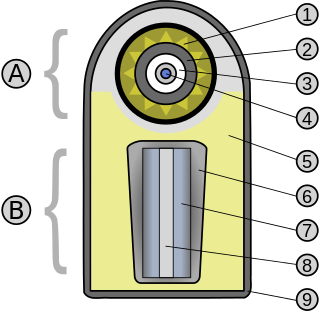
A thermonuclear weapon, fusion weapon or hydrogen bomb is a second-generation nuclear weapon design. Its greater sophistication affords it vastly greater destructive power than first-generation nuclear bombs, a more compact size, a lower mass, or a combination of these benefits. Characteristics of nuclear fusion reactions make possible the use of non-fissile depleted uranium as the weapon's main fuel, thus allowing more efficient use of scarce fissile material such as uranium-235 or plutonium-239. The first full-scale thermonuclear test was carried out by the United States in 1952; the concept has since been employed by most of the world's nuclear powers in the design of their weapons.
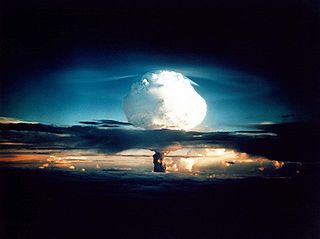
The Teller–Ulam design is a technical concept behind modern thermonuclear weapons, also known as hydrogen bombs. The design – the details of which are military secrets and known to only a handful of major nations – is believed to be used in virtually all modern nuclear weapons that make up the arsenals of the major nuclear powers.

Steven Joseph Zaloga is an American author and defense consultant. He received a bachelor's degree cum laude at Union College and a master's degree at Columbia University, both in history.
Plan Totality was a disinformation ploy established by US General Dwight D. Eisenhower in August 1945 by order of US President Harry S. Truman after the Potsdam Conference.

Haakon Maurice Chevalier was an American writer, translator, and professor of French literature at the University of California, Berkeley best known for his friendship with physicist J. Robert Oppenheimer, whom he met at Berkeley, California in 1937.

Joseph Wright Alsop V was an American journalist and syndicated newspaper columnist from the 1930s through the 1970s. He was an influential journalist and top insider in Washington from 1945 to the late 1960s, often in conjunction with his brother Stewart Alsop.

Chuck Hansen was the compiler, over a period of 30 years, of the world's largest private collection of unclassified documents on how America developed atomic and thermonuclear weapons.

The Oppenheimer security hearing, conducted by the United States Atomic Energy Commission (AEC) over four weeks in 1954, explored the background, actions, and associations of J. Robert Oppenheimer, the American scientist who directed the Los Alamos Laboratory during World War II as part of the Manhattan Project to develop the atomic bomb. The hearing resulted in Oppenheimer's Q clearance being revoked. This marked the end of his formal relationship with the government of the United States, and generated considerable controversy regarding whether the treatment of Oppenheimer was fair, or whether it was an expression of anti-communist McCarthyism.

The Bombing of Kōfu in World War II was part of the strategic bombing campaign waged by the United States against military and civilian targets and population centers of the Empire of Japan during the Japan home islands campaign in the closing states of World War II.
Allan R. Millett is a historian and a retired colonel in U.S. Marine Corps Reserve. He is known for his works on the Korean War, but he has written on other military topics.

William Liscum Borden was an American lawyer and congressional staffer. As executive director of the United States Congress Joint Committee on Atomic Energy from 1949 to 1953, he became one of the most powerful people advocating for nuclear weapons development in the United States government. Borden is best known for having written a letter accusing physicist J. Robert Oppenheimer of being an agent of the Soviet Union, an accusation that led to the Oppenheimer security hearing of 1954.

















